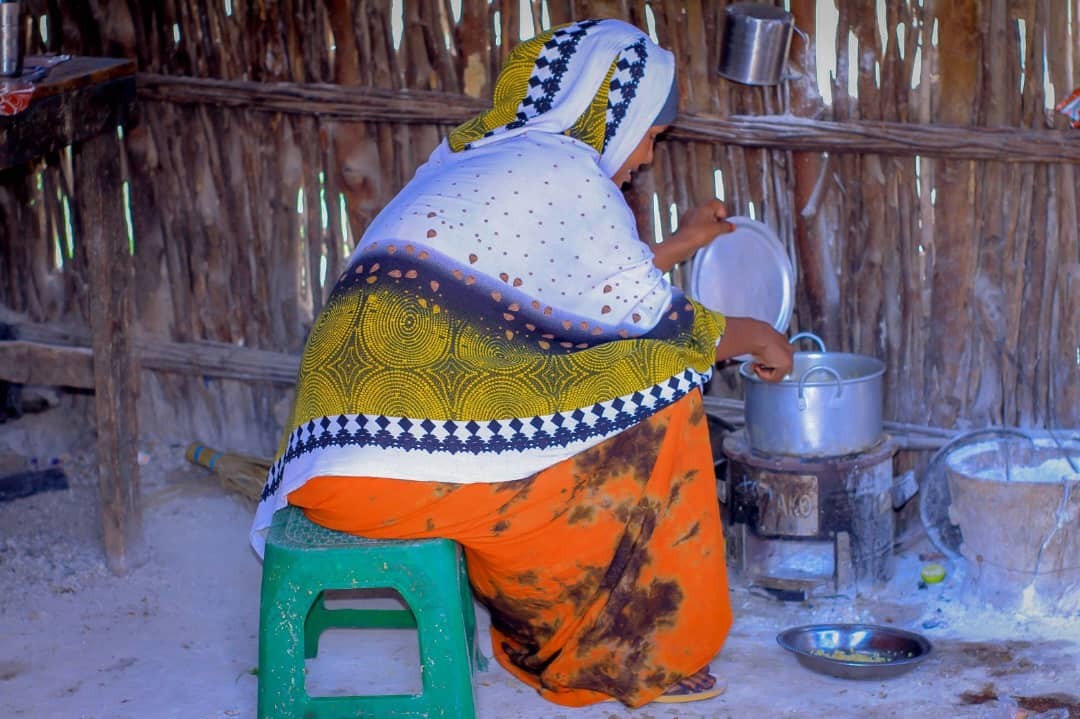18-12-2024 | di COOPI
Somalia. How cash transfers transformed Salima's life
Salima Hassan Ahmed aged 33 is a mother of 10 who owns a small farm, 7 goats and resides in Buula Bagabaash, Berdale District, Somalia. Her life experience is a proof of the challenges that people in her condition often face and of the transformative impact that cash transfers can have on livelihoods.
She explains,
Before I began receiving unconditional cash transfers, my life was a constant struggle, even with my small farm and seven goats. As a married mother of ten in Berdale District, I faced overwhelming challenges every day. While my farm provided some food for our family, the income it generated was often insufficient to cover our basic needs. My husband works alongside me on the farm, but he also took on daily wage jobs to help support our family. Juggling these jobs and our farm duties left us both exhausted, yet the unpredictable weather and market fluctuations made it difficult to rely on either source of income for stability. The stress of not being able to provide for our children weighed heavily on us, and we often felt trapped in a cycle of debt and anxiety. I worried about how to keep my family safe and healthy, especially when unexpected expenses arose, like medical bills or school fees.”
Salima’s household, is one of the 48 households in Bagabaash Rural village, benefiting from the unconditional monthly cash transfer program that covers 500 households in the district of Berdale. The households receive $120, per month for 3 months, under the Integrated Implementation of Multipurpose Cash Assistance to alleviate suffering of newly displaced and newly accessible Somali households affected by droughts, floods and protracted crisis, project. Implemented by COOPI - Cooperazione Internazionale, with financial support from the European Humanitarian Aid (ECHO), the project aims not only to improve the livelihoods of households affected by conflict or severe climate events but also to help beneficiaries achieve psychological healing by restoring a sense of normalcy and stability in their lives.
After receiving the first round of cash transfers, I felt an immediate sense of relief. I was able to pay off outstanding debts of $60, which had been a constant source of anxiety for me. I used the funds to purchase essential food items, ensuring that we had enough to eat. Now, we can buy sufficient amounts of meat, eggs, rice, flour, and fresh green leafy vegetables, allowing me to prepare nutritious meals for my family 2 to 3 times a day, for the whole month. When I received the second round of cash, my joy was mixed with worry, as one of my children fell ill. I had to take him to the hospital, and I was relieved that I had saved up $30 from the previous funds. This money helped cover some of the medical expenses, allowing me to focus on caring for my child without the added stress of financial strain. By the time I received the third round of cash transfers, I managed to save $40, although I would have saved more, had it not been the challenges I had before the cash intervention,”
Salima shares.
The Berdale District is a vibrant and diverse region known for its rich cultural heritage and strong community ties. Nestled among rolling hills and fertile plains, the district thrives on agricultural activities that are central to its local economy. Despite its natural beauty, Berdale faces significant challenges, including economic instability and limited access to education and healthcare. Many families struggle to meet basic needs, prompting initiatives aimed at providing support to the most vulnerable.
Thanks to the project, those who received unconditional cash transfers have witnessed improved livelihoods across eight domains including higher household consumption, better asset holding, monthly income, better food security, female empowerment, and psychological well-being, indicating the positive impact the initiative has had on these households.
The cash strengthened our recovery efforts from devastation of the floods and the displacement boosting our purchasing power for our necessities. It has also come in handy especially during this time when food has been scarce in the market and prices have skyrocketed. The cash has saved us from falling back into desperation,”
Salima adds.
I am very happy that the cash assistance has not only helped me improve the welfare of my family, but also brought a bonding effect as we collectively make decisions on its use to benefit us all. We are forever grateful to COOPI, SCC and ECHO for the timely intervention”,
a visibly happy Salima appreciates.

COOPI has been working in Somalia since 1981 and has been part of the Somali Resilience Program (SomReP) consortium since 2012, with which it implements resilience programmes in the Bay and Gedo regions and intervenes in the districts of Baidoa, Dollow and Belet-Hawa. In each intervention, depending on the context, COOPI integrates one or more cross-cutting areas: protection, gender, environment and disaster risk reduction.




 Somalia
Somalia